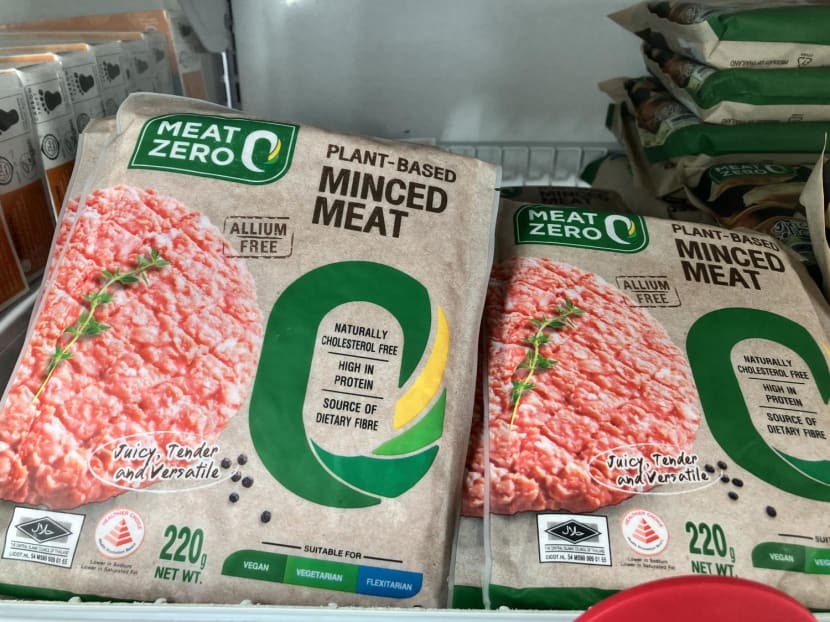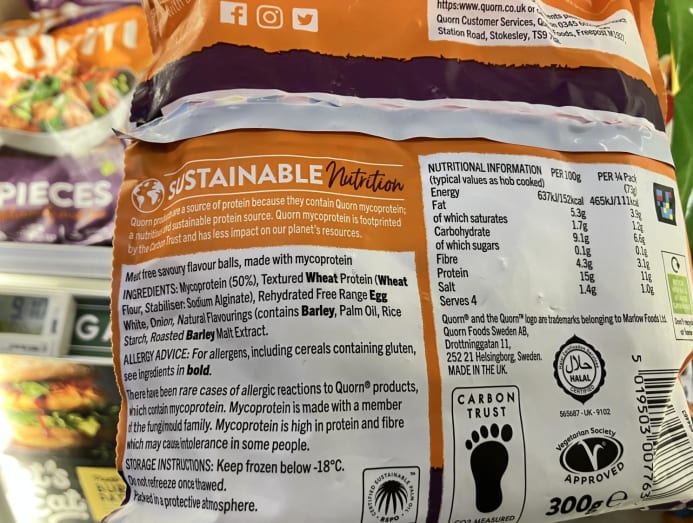Is plant-based meat healthy? Here’s what you need to know as a consumer

Stocks of plant-based meat at a supermarket. Some of such products are marked “allium free” to indicate to vegetarians who do not eat alliums such as onions, garlics, shallots and chives. Photo: CNA
SINGAPORE — At some supermarkets, plant-based “meat” products are getting more shelf space or even an entire section of a fridge, unlike what it was a decade ago.
These meat-less alternatives are getting on plates as some home cooks experiment with incorporating them in pasta, soups or noodles, or they are offered at eateries as “meatballs”, dumplings and fillings for burgers, among other dishes.
In 2020, Singapore became the first country to approve the commercial sale of laboratory-grown protein, also known as cultured or cultivated “meat”.
Since then, more startups have joined frontrunners in launching or developing their own animal-free alternatives or fermentation-enabled proteins.
Whether you are concerned about your health, animal welfare or the environment, or it is a part of your religious practices, the choices for meat-free food have widened in recent years.
However, not all plant-based meat substitutes are created equal and one cannot rule out the possibility that certain manufacturers may merely be taking advantage of the trend to make a fast profit.
TODAY spoke to a dietitian, a food scientist and an endocrinologist to take a closer look at what these products contain and how healthy an alternative they really are for people who choose not to eat meat.
WHY THE INTEREST IN PLANT-BASED MEAT?
Ms Shanice Lim, a dietitian at Ng Teng Fong General Hospital, said that the increased demand for meat-less products can be attributed to taste preferences and dietary restrictions due to ethical or religious reasons.
Our (own consumer studies) findings revealed that curiosity, nutrition and sustainability were the leading reasons for the growing popularity of plant-based meat, especially among younger generations.
The meat production industry is responsible for a significant amount of greenhouse gas emissions, especially beef production, so the food that people consume can contribute to climate change.
Furthermore, there is the concern over food security.
As a food trend, the new generation of plant-based products look likely to stay as part of plans by organisations around the world to build a stabler food system and meet goals to tackle climate change.
Associate Professor Du Juan at the Singapore Institute of Technology, who is from its food, chemical and biotechnology cluster, said that research funding is available to support the food industry in collaborating to generate novel foods, including plant-based food products.
Active government funding, for instance, has accompanied Singapore’s aim to produce 30 per cent of its nutritional needs domestically by 2030, thereby advancing the alternative protein sector.
Apart from that, Assoc Prof Du Juan also said that consumer preferences have been pivotal in driving the demand for plant-based or lab-grown meat substitutes.
“Our (own consumer studies) findings revealed that curiosity, nutrition and sustainability were the leading reasons for the growing popularity of plant-based meat, especially among younger generations.”
The studies also showed that some consumers would not regularly buy and eat plant-based meats due to factors such as undesirable taste and texture.
IS PLANT-BASED MEAT SAFE TO EAT?
Plant-based meat products are subject to stringent regulations to ensure that they adhere to safety and health standards.
Assoc Prof Du Juan said: “Similar to other food products, the production of plant-based meat has to follow the Hazard Analysis & Critical Control Point (HACCP) practices.”
HACCP is a management system that identifies critical processing conditions and validates measurements to ensure food safety and quality.
WHAT GOES INTO PLANT-BASED MEAT?
Plant-based meat is designed to replicate the taste and sensory appeal of animal meat, so manufacturers may use a variety of protein sources such as soy, pea and wheat protein.
Advances in food technology have even enabled microbial sources such as algae to be used in producing these alternatives.
Plant-based meat can also be made with potato protein, Assoc Prof Du Juan said.

Plant-based meat can also be made with potato protein, Assoc Prof Du Juan said.
The main ingredients of a plant-based meat substitute play an important role in determining their nutritional value.
For instance, soy-based products are typically high in protein and provide other nutrients such as iron and calcium.
Ms Lim the dietician said: “Pea protein is another popular option, because it offers more protein with lower calories and fat compared to soy-based products.
“Wheat gluten is rich in protein, but may not provide the same range of nutrients as soy or pea-based products.”
WHY PLANT-BASED MEAT CAN BE A HEALTH RISK
1. HIGHLY PROCESSED OR REFINED INGREDIENTS
Even though the base of plant-based meats would be a plant such as soybeans, peas or wheat, these ingredients may be highly processed or refined by the time the product ends up on shelves.
Plant-based substitutes are often more processed and contain more additives, flavour enhancers, texturisers and preservatives to improve their taste and texture, Ms Lim said.
This level of processing can result in higher sodium content and the inclusion of less desirable ingredients such as hydrogenated oils and processed starches, the dietician added.
How much nutrients are left after processing is debatable.
In contrast, traditional plant proteins such as legumes (beans and peas) and beancurd are minimally processed and nutrient-dense. They are a richer source of fibre and plant-derived nutrients that include antioxidants, vitamins and minerals.
2. SHORTFALL IN NUTRIENTS
Another concern with plant-based meats is the lack of several essential nutrients that are usually found in animal meat.
Ms Lim said: "Vitamin B12 is typically absent in plant-based meats unless they are fortified.
"Even then, the body may not absorb (the fortified vitamin B12 from plant-based substitutes) as efficiently as they would from animal sources."
The same goes for iron and zinc.
“While plant-based meats do contain iron and zinc, they are usually in forms that are less readily absorbed by the body compared to the ones found in traditional meats,” she added
3. PRESENCE OF ALLERGENS
Ms Lim cautioned that soy is a common allergen and meat substitutes made from it may therefore be unsuitable for those with food allergies.
People with gluten intolerance or celiac disease, which is a long-term autoimmune disorder that causes a person to develop an intolerance to gluten, will obviously have to eschew products made with wheat gluten.
Other common plant-based meat ingredients such as pea protein, nuts, tree nuts, as well as coconut may also potentially cause allergic reactions.
WHAT’S GOOD ABOUT PLANT-BASED MEAT
1. POTENTIAL BENEFITS FOR HEART HEALTH
Ms Lim said that plant-based meats are typically lower in saturated fats than animal meat, especially when it comes to red and processed meat.
Plant-based meat may therefore have a positive impact on cholesterol levels and potentially lower one’s risk of heart disease.
2. GOOD SOURCE OF PROTEIN
Plant-based meat substitutes are a good option for people on a high-protein diet, since they are “designed to match or even exceed the protein content of traditional meats, offering a substantial protein source without the cholesterol found in animal products”, Ms Lim said.
This also makes plant-based meat substitutes a viable choice for vegans and vegetarians in need of a protein-rich alternative that aligns with their ethical or environmental values.
3. SUPPLEMENTS WEIGHT LOSS PLANS
If one is on a low-calorie diet for weight loss, certain plant-based meat variants that are lower in calories than animal meat may help with that.
The higher fibre content of these meat alternatives may also improve digestion, reduce the risk of chronic diseases and aid in satiety.
With higher satiety, one will feel fuller for longer, which can help with weight management, Ms Lim said.
“Some plant-based meat products (such as those made from mycoprotein, a meat-free protein derived from fungi) contain more fibre, which contributes to digestive health by promoting regular bowel movement and supporting a healthy gut microbiome.”

Dr Ben Ng, senior consultant endocrinologist at Arden Endocrinology Specialist Clinic, said that some plant-based meats contain fibre prebiotics, which can feed the good bacteria in the gut, particularly those in the large intestine.
“Gut health is extremely important as it plays a key role in digestion and nutrient absorption, immune system function and weight management,” he added.
WHAT ELSE TO NOTE ABOUT PLANT-BASED MEAT
Ms Lim cautioned that the benefits above depend on a plant-based meat’s specific formulation and requires careful review of the nutritional information panel of the product, because not all products are equally high in fibre.
These benefits may be negated if the plant-based meat is highly processed.
If it is high in sodium, consuming it frequently may put one at risk of high blood pressure, which in turn is a major risk factor for cardiovascular diseases such as heart attacks and stroke, she said.
“Excessive consumption of sodium may also lead to kidney problems such as chronic kidney disease.”
On top of that, the lack of vitamin B12, iron and zinc in plant-based meat substitutes can lead to nutritional deficiencies, posing a substantial risk to one’s health.
A lack of vitamin B12 and iron can both lead to anaemia (insufficient red blood cells), while zinc deficiency impairs the body’s immune response and slows wound healing.
This is why Ms Lim does not recommend replacing animal sources of meat with plant-based proteins entirely.
Dr Ng the endocrinologist pointed out specific concerns related to blood sugar management.
He said that besides having high sodium content, plant-based meat substitutes can have higher levels of fat, carbohydrates and potassium.
These can raise blood sugar levels and blood pressure, all of which are common in people with diabetes.
Furthermore, plant-based meat substitutes can affect and disrupt the production of hormones if they contain a high amount of endocrine disruptors such as phytoestrogens in additives and packaging.
Phytoestrogens are naturally occurring plant compounds that are similar in structure and function to oestrogen, a hormone in women.
Soybeans and edamame are the most common food sources of phytoestrogens, for example.
In short, the effects that phytoestrogens have on the human body are similar to oestrogen, albeit slightly weaker.
As an endocrine disruptor, phytoestrogens can mimic, block or interfere with the body’s hormone systems, Dr Ng added.
WHAT THE EXPERTS ADVISE
In terms of the effects of plant-based meat substitutes on health in the long term, both Dr Ng and Ms Lim agreed that they remain unclear due to limited data.
Dr Ng’s advice to vegans or vegetarians who want to consume more plant-based meat substitutes regularly is to speak to a nutritionist to work out a natural plant-based diet and protein sources — as they already should due to nutrients lacking in their diets.
Another point to note is that not all plant-based meats are vegan. Some of them contain eggs and dairy, so check the ingredients list.

For the overall population, moderation is key, so take plant-based meat as part of a balanced diet that includes other traditional protein sources, healthy food and drinks.
Dr Ng said that consuming plant-based meats can be considered if it is a preference — likened to people who prefer to have unsweetened soft drinks.
However, it should not be considered if it is done with the purpose of changing one’s diet completely to rely solely on such alternative products in the name of leading a healthy lifestyle.
WHAT TO DO WHEN SHOPPING FOR PLANT-BASED PRODUCTS
When buying plant-based meat products, consumers should:
- Read what is printed on the packaging and examine the ingredient list, or check the product’s website for information. Choose products that have a short list of recognisable ingredients, as opposed to those with excessive additives and artificial components

2. Compare the levels of sodium, saturated fat and added sugars between different brands
3. Aim for products with a balanced nutritional profile that includes an adequate amount of protein and fibre. Note that people advanced in age will require slightly more protein to maintain muscle mass
4. Consider the quality of protein in the product. Look for plant-based meat that provides all nine essential amino acids that one needs to get from food — either blended with plant proteins such as grains and legumes, or fortified with amino acids such as lysine or tryptophan. (The other essential amino acids are histidine, isoleucine, leucine, methionine, phenylalanine, threonine and valine.)
WAYS TO INCLUDE PLANT-BASED MEAT IN A HEALTHY DIET
Although plant-based meats are not recommended as a total replacement for animal meat, there are still ways to consume it as part of a healthy, balanced diet.
Dr Ng said: “If you enjoy consuming them, please do so but in smaller quantities.”
They also should not replace whole, minimally processed plant food such as beans, lentils, vegetables and grains, which offer a more balanced nutritional profile without extensive processing, Ms Lim the dietician said.
Alternatively, use them as direct substitutes for meat in familiar recipes.
“For example, you can replace minced meat with plant-based mince in dishes like bak chor mee (minced pork noodles) or use plant-based burger patties in a classic burger,” she suggested.
Another way is to combine plant-based meat with other plant proteins, such as mixing plant-based mince with lentils or beans in Mexican-style dishes, or mixing it with chopped tau kwa (firm beancurd) when making Chinese dumplings.
Incorporating plant-based meats into a varied diet, rather than depending on them exclusively, will help maintain a balanced intake of nutrients, she said.
THE FUTURE OF PLANT-BASED MEAT
As more consumers open up to the idea of plant-based meat, there have also been various innovations in the field happening on home ground.
One of them is Tindle, where its plant-based chicken has been reimagined as nuggets, tenders, wings and more.
Assoc Prof Du Juan from the food, chemical and biotechnology cluster at the Singapore Institute of Technology (SIT) said that contract manufacturers of plant-based meat such as SGProtein are supporting extrusion processing to produce high-moisture meat analogues.
Meat analogues are a type of plant-based meat substitute prepared specifically from plant proteins and they possess the same flavour, texture and fibre-like structure as animal meat.
As for extrusion processing, it is a processing technology that uses a high level of moisture to produce a structure of meat analogue with a moisture content that is closer to fresh animal meat.
She added that there have also been launches of plant-based food options outside of meat, for example, the ProteinPlus vegan cheese.
At SIT, she revealed that the institution has kickstarted an Industry Alignment Fund (Pre-positioning) project, funded by the Agency for Science, Technology and Research.
The project is a first-in-Asia testbed platform that aims to advance research on plant-based proteins.
It also facilitates collaborations with the plant-based meat industry to produce products such as non-dairy whipping cream, non-dairy ice cream, as well asplant-based fishcake and fishballs.
Asked how the plant-based meat industry could address the concerns of unhealthy additives and ingredients, Assoc Prof Du Juan said that manufacturers should consider factors other than the taste of the product, which is what leads to higher calories and sodium content.
Besides that, the food regulatory authorities may want to promote the Healthier Choice Symbol programme further in assessing the benefits of plant-based food.
The programme already includes some guidelines for plant-based products such as plant-based meat alternatives and plant-based milk.
“(Like for all other food products) doing so would encourage manufacturers to produce healthier products for consumers,” Assoc Prof Du Juan said.






